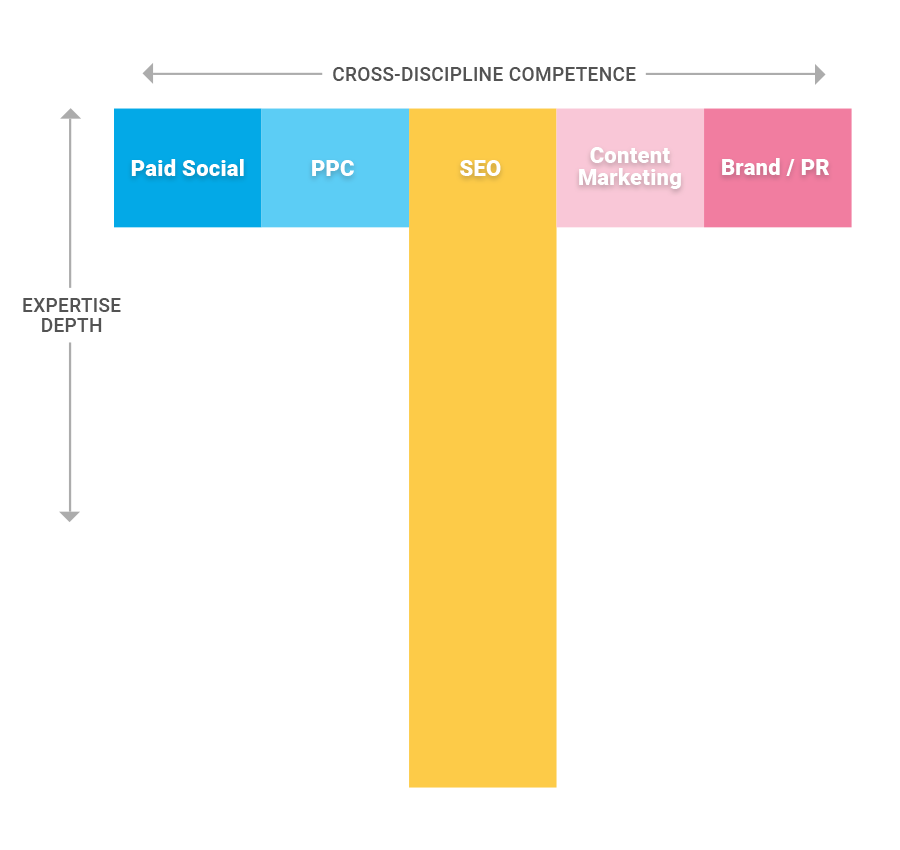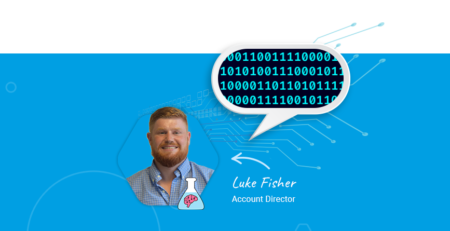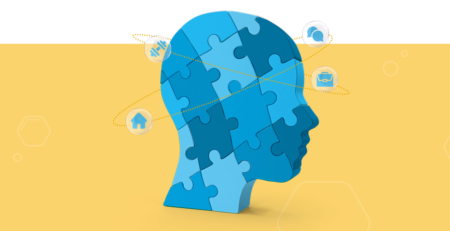Building a T-Shaped skill set for digital marketing
The recent recession has left millions of people out of a job, with many industries uncertain of when or how they’ll return to normalcy. Subsequently, people are searching for new opportunities in industries where they have no previous experience. I understand that this can be a daunting process. Personally, after 10 years of working in fashion, I took a huge risk by choosing digital marketing. The biggest question I had was, “Do I have the required skills to become a digital marketer?”
The good news, I found out, was that I didn’t necessarily need all the “required skills” to gain experience. In fact, a recent survey conducted by Rand Fishkin shows that 40% of marketers were self-taught or had no formal marketing training when they started. This implies that many marketers actually learn the skills they need on the job.
So how do you get into digital marketing? Many companies, including Brainlabs, look for people with “T-shaped” skills, which means candidates have knowledge in a wide breadth of disciplines and eventually hone in on 1-2 specialties. I will further explain this concept and hopefully inspire you to take the dive into digital marketing.
What is the T-Shaped Skill Model?
The term “T-shaped” skills goes back to the ’90s when it was popularized by David Guest and IDEO CEO Tim Brown. It refers to the qualities that make an employee valuable, and is represented in the image below. The vertical bar on the “T” represents the depth of an individual’s unique skills or specialities, while the horizontal bar shows the range of skills and ability to collaborate with other areas of expertise.

The reason T-shaped individuals are seen as very valuable to employers is that they can tackle diverse projects with creativity and agility while maintaining high effectiveness. They know enough to implement the knowledge of experts and know when to bring experts of other disciplines to the table.
On the other hand, if an individual has some knowledge about many different topics, but is not an expert in a single subject, they are what’s known as “generalists” (imagine the “T” but without the vertical bar). This means that they have skills in a wide range of topics, but have not reached an expert level in any particular subject. Generalists tend to know enough that they can navigate communications about different disciplines, but they’re limited in their ability to fully contribute to meaningful team collaborations.
Conversely, there are also “I-shaped” marketers, who are rock stars in their field of expertise, but haven’t built basic competence across multiple disciplines. As a result, they need to stay in their wheelhouses or risk the failure to deliver value when they stray. An I-shaped marketer provides value only in their discipline, which can cause issues with building a versatile team.
Exploring Cross-Disciplinary Skills
Now that you know that “T-shaped” skills are most desirable, how do you figure out what to specialize in? The first step is to become competent in “cross-disciplinary skills” (horizontal bar) and be able to “talk the game.” In other words, you should know (or at least be confident enough to speak to) a wide range of topics. Digital marketing covers many areas, including SEO, Paid Search, Social Media, and Content, to name a few. It’s important to understand multiple disciplines since much of digital marketing requires collaboration and working in teams.
We now know that we must first explore different disciplines to find what we like and what we’re good at, but how do we go about accomplishing this? It’s difficult to know where to start, but here are some suggestions to kick things off:
- Do your research – This may seem simple, but is usually extremely involved. Personally, when I first decided to pursue a digital marketing career, I started reading as much as I could about various topics. Here are some notable online resources for news, strategies, how-to’s, and all things digital marketing: Search Engine Journal, Moz and Marketing Land. I also started following well-known marketers on LinkedIn (you could use another social media platform, like Twitter). They post so much insightful information, and many have written blog articles that are super helpful. Digital marketers are also open and happy to help fellow or aspiring marketers, so reach out and ask questions.
- Apply for an internship – Many marketers I know all began as interns, myself included. It’s a great way to learn the skills you’ll need and apply them to actual work. Plus you get a taste of a particular discipline you might be interested in learning more about. Believe it or not, in this current tough economy companies are still hiring interns. Some reliable sites to check are LinkedIn, Indeed, and Ziprecruiter.
- Take an assessment – Almost all digital marketing positions require some knowledge of Google Analytics, and Google offers free study materials at Analytics Academy. If you want to go the Paid Search, Display Ads or video ads route, it’s a good idea to get a Google Ads certification. While you are job hunting you can study for these online assessments and receive special certifications, which will reflect well on your resume.
Build Up Your Expertise
Once you have accumulated general knowledge in a range of digital marketing topics, the next step is to cultivate deep knowledge in one area. How do you go about doing this? The short and oversimplified answer is: keep learning, keep doing. When you discover an area that interests you, dive deeper to learn everything you can about the topic. Speak to people who are experts in that area and get their insights. Practice the skills required to be proficient. Of course, this process can take some time and hard work. But keep in mind, the more you learn about a specific topic, the more valuable you will become to your colleagues while also building authority in the field at the same time.
Marketing influencers are great examples of T-shaped marketer role models. These influencers are recognized not because they have lots of general knowledge, but because they are experts in their respective fields. Britney Muller, a renowned SEO scientist, is an industry leader who has spoken at great lengths about AI and machine learning. Elizabeth Marsten is a paid search superstar with a focus on eCommerce. Flavilla Fongang is a neuroscience brand expert and thought leader in customer experience. Each marketer has their niche, and collectively they could solve any marketing problem (the ultimate dream team!).
We Are Stronger Together
There is a misconception about digital marketing that I want to clear up – we don’t have secret technology to help us do our jobs well. We do, however, use a plethora of tools that make our jobs a little bit easier (most of the time). But our true “secret weapon” is that we surround ourselves with other “T-shaped” people, which makes our teams stronger as a whole (like the Avengers!).
Our company has set a great example of “T-shaped” marketing in action. In February 2020, we merged with Distilled & Hanapin, both renowned agencies with expertise in SEO and PPC respectively. In doing so, we have broadened our collective “horizontals,” and expanded our collective “verticals.” There have been many new skills for all of us to learn about, and we are becoming better collaborators in the process. This makes our teams stronger as a whole and allows us to provide exceptional digital marketing services.
Updated post by Grace Frohlich
Original post by Mike Tekula




